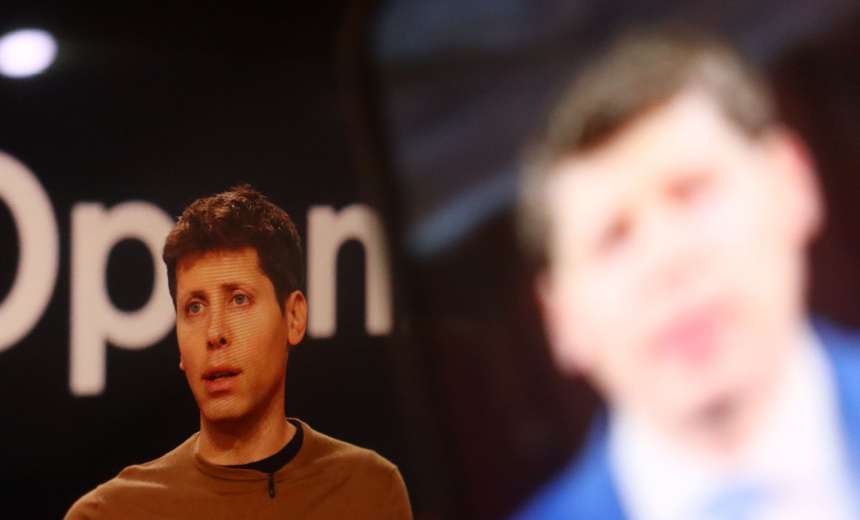Nonprofit Foundation Holds Equity, Oversight Around $130B For-Profit Corporation

OpenAI completed a recapitalization and corporate restructuring that clarified and reinforced the relationship between its nonprofit mission and its for-profit operations, the company said Tuesday.
See Also: The Rise of Agentic Commerce: Building Secure, Trusted Payments for the AI-Driven Economy
The San Francisco-based artificial intelligence research behemoth said the nonprofit OpenAI Foundation will ensure artificial general intelligence benefits all of humanity while maintaining control and oversight of the OpenAI Group public benefit corporation. The Foundation retains the right to appoint and remove board members of the OpenAI Group and enforce decisions on AI safety and security matters, OpenAI said.
“The nonprofit remains in control of the for-profit, and now has a direct path to major resources before AGI arrives,” OpenAI Chair Bret Taylor wrote Tuesday. “The nonprofit, now called the OpenAI Foundation, holds equity in the for-profit currently valued at approximately $130 billion, making it one of the best-resourced philanthropic organizations ever.”
Critics have argued for months that OpenAI’s transition to a for-profit PBC structure represented a commodification of intelligence that undermines the organization’s original philanthropic foundation. In an April letter to regulators, critics and former OpenAI staff argued that OpenAI’s mission to serve humanity can’t coexist with incentives to deliver financial returns (see: OpenAI to Retain Nonprofit Oversight Amid For-Profit Shift).
Why the Nonprofit Arm Will Retain Control Over For-Profit Unit
OpenAI said its Foundation retains full governance control over the for-profit group through ownership of Class N Common Stock, giving it the exclusive ability to appoint or remove board members and block changes to the for-profit’s mission, charter or sale. All decisions concerning AGI and safety will be made in support of the mission rather than shareholder profit, according to OpenAI.
“The OpenAI Foundation continues to control the OpenAI Group,” OpenAI wrote on its website. “It now holds conventional equity in the OpenAI Group – with all stockholders participating proportionally in any increase in value of the OpenAI Group – aligning long-term incentives around impact and growth.”
Both the California and Delaware attorneys general demanded and got guarantees that the OpenAI Foundation retains absolute governance control over the for-profit PBC. The PBC board must consist of a majority of independent directors who are not company executives, OpenAI said, while committees for Audit & Risk, Compensation, and Nominating & Governance are now mandated to be independent-only.
“The PBC Board will be composed of a majority of independent directors, reinforcing oversight,” states a memorandum of understanding between OpenAI and California Attorney General Rob Bonta. “These independent directors will not be employees or members of management, and, in the determination of the PBC Board, will have no relationship or interest that could compromise their judgment.”
OpenAI’s Safety and Security Committee remains under the exclusive control of the OpenAI Foundation, ensuring that decisions about model deployment and AI system risks are governed by a body whose only obligation is to public safety. The committee can veto releases of any models or systems deemed unsafe, even when internal risk thresholds would otherwise allow release, providing a “kill switch.”
“The SSC has and will continue to have the authority to require mitigation measures – up to and including halting the release of models or AI systems – even, for the avoidance of doubt, where the applicable risk thresholds would otherwise permit release,” said the California memorandum. “The NFP will provide advance notice to the attorney general of any material changes to the SSC’s authority.”
What California, Delaware AGs Demanded From OpenAI
The California and Delaware attorneys general involvement brought significant public oversight into what is typically a private restructuring, with California securing commitments including control rights for the foundation and advanced notice of material governance changes. Delaware’s Statement of No Objection is contingent upon safeguards designed to ensure financial interests never override safety.
“This was a long and intensive negotiation – but I am pleased that OpenAI committed to a governance structure going forward that requires primacy for safety and security, and to utilize this technology and this corporation’s resources to benefit the public,” Delaware Attorney General Kathy Jennings said in a statement Tuesday.
A revised agreement between OpenAI and Microsoft grants Microsoft extended IP rights until 2032 and preserves Azure cloud exclusivity for API-based products and Microsoft’s role as the “frontier model” deployment partner for OpenAI. OpenAI also committed to purchase $250 billion in Azure compute services, but Microsoft’s previous right of first refusal on compute contracts has ended, according to Microsoft.
“The agreement preserves key elements that have fueled this successful partnership – meaning OpenAI remains Microsoft’s frontier model partner and Microsoft continues to have exclusive IP rights and Azure API exclusivity until artificial general intelligence,” Microsoft said. “It also refines and adds new provisions that enable each company to independently continue advancing innovation and growth.”
With newfound capital from its equity stake, the OpenAI Foundation will spend $25 million on open-sourced datasets for health and disease cures, accelerating diagnostics and supporting medical researchers with cutting-edge tools. The money will also be used to develop practical, technical tools to safeguard global infrastructure in the AI era, similar to how security matured alongside the internet.
“The OpenAI mission – ensuring that AGI benefits all of humanity – will be advanced through both the business and the Foundation,” Taylor wrote. “The more OpenAI succeeds as a company, the more the nonprofit’s equity stake will be worth, which the nonprofit will use to fund its philanthropic work.”
